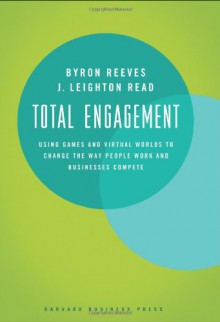
In this book, Tim Guest writes about his experiences in virtual worlds like Second Life, his interviews with people who take part in virtual worlds, the different ways virtual worlds get used, and more. It's not a systematic exploration of topics pertaining to virtual worlds, but it's often interesting. My favorite parts of this book were Guest's interviews and anything that discussed some of the creative ways virtual worlds have been used.Guest spoke with people at Linden Labs (the creators of Second Life), a Korean man who is the king of kings in Lineage II, a few people who managed to make money in virtual worlds in ways that would be clearly illegal if they were done in the real world (replicating virtual gold, for example) but aren't always so clearly illegal when done in virtual worlds, the man behind a virtual mafia don, and more. Many of these people were fascinating, and I found myself wishing that Guest would talk less about himself and more about these other people.Although I realize that Guest's discussions about his own background were outnumbered by his discussions about everything else, it got to the point where I was a little annoyed about reading, yet again, about Guest's perpetual money problems, his bad luck, his girlfriend, and his mother (who was apparently in a cult, had a guru, and whose interests meant that her son grew up in a commune). Guest's own life and experiences color how he views virtual worlds - I thought it was particularly interesting how his experiences in the commune led him to see Linden Labs as something like a cult - but I picked this book up to read about virtual worlds, not about Guest, and I sometimes felt that Guest was getting a little repetitious when bringing himself up.In addition to Guest's interviews, I also enjoyed reading about the various ways people have used virtual worlds. There are many people who might hear about virtual worlds like Second Life, EverQuest, and others and believe them to be just about entertainment, but they often get used and created for other reasons. People find love, make lasting friendships, and have experiences that they couldn't possibly have in the real world (the best example of this is Wilde Cunningham, a Second Life resident played by a group of nine men and women with cerebral palsy).Real world reporters have given a lot of attention to those who manage to make a living in virtual worlds, and Guest discusses that as well, mentioning Anshe Chung (an incredibly wealthy avatar in Second Life, one of the many games where virtual currency can be turned into real world currency and back again) and others. However, he tries to balance his discussion by saying that very few residents of Second Life (and, presumably, other virtual worlds) actually make enough money to live off of in the real world. Later on in the book, Guest writes about virtual worlds that have been created for training purposes, such as virtual worlds used by the military to train people in tactics and strategy or to train people to more effectively evaluate situations (if players mess up in a virtual world, no one dies and they can try again until they get better, whereas similar mistakes in the real world are less forgiving).In addition to some of the more positive ways virtual worlds get used by their players, Guest also writes about other ways players use these worlds. There are griefers, people who play these games simply to harass and aggravate other players - these players may view their style of playing as entertainment, but the targets of griefing often do not agree with them. There are virtual mafiosi - the activities of these people depend upon the game being played, but in Second Life, for example, they might be hired to make certain players violate the game's terms of service, thereby getting their accounts suspended. There's also the virtual sex trade - at one point, to get an idea of one aspect of Second Life's sex trade, Guest uses a Second Life avatar to hire a virtual hooker.I started reading this book shortly after finishing [b:The Second Life Herald: The Virtual Tabloid That Witnessed the Dawn of the Metaverse|671511|The Second Life Herald The Virtual Tabloid That Witnessed the Dawn of the Metaverse|Peter Ludlow|http://d.gr-assets.com/books/1347810907s/671511.jpg|657542] by Peter Ludlow and Mark Wallace, and I couldn't help but compare the two. Although I occasionally felt that Ludlow and Wallace's writing was a little confusing, I enjoyed their book more than I did Guest's. Like Guest, Ludlow sometimes wrote about himself, and he often wrote about his personal experiences in virtual worlds, but when Ludlow did this it was rarely repetitive and usually added something to the reader's knowledge of virtual worlds. Also, when Guest begins his book, he is in awe of virtual worlds, and this awe never goes away - he loves writing, again and again, about how someone in Second Life can pull a building out of his or her pocket, or fly, or jump off tall buildings for entertainment. This may sound like a good thing, but, as with Guest's writings about himself, it can get a little repetitive. It also makes Guest seem like a perpetual outsider when it comes to virtual worlds, despite the home he decided to purchase inside one. Ludlow, on the other hand, manages to be both an insider and an outsider, trying to stay objective as he investigates his stories, but investigating them as though the virtual world were any other place.I imagine that some readers will prefer one style of writing over another, and, for me, Ludlow and Wallace's book was a better read. Both books cover many of the same topics and involve interviews with some of the same type of people (Linden Labs people, griefers, people involved in the virtual sex trade, etc.), but often one book covers certain topics better than the other.Overall, Guest's book was nice, with some very interesting moments (I loved the interviews with Wilde Cunningham and Kyu Nam Choi, Lineage II's king of kings).(Original review, with read-alikes and watch-alikes, posted on A Library Girl's Familiar Diversions.)

 Log in with Facebook
Log in with Facebook 







